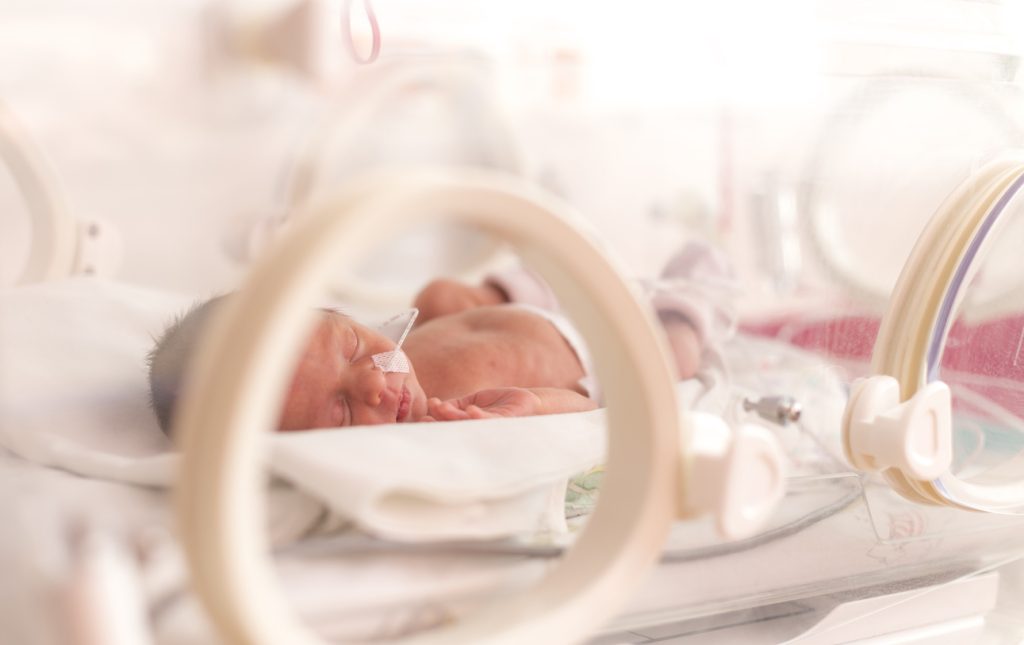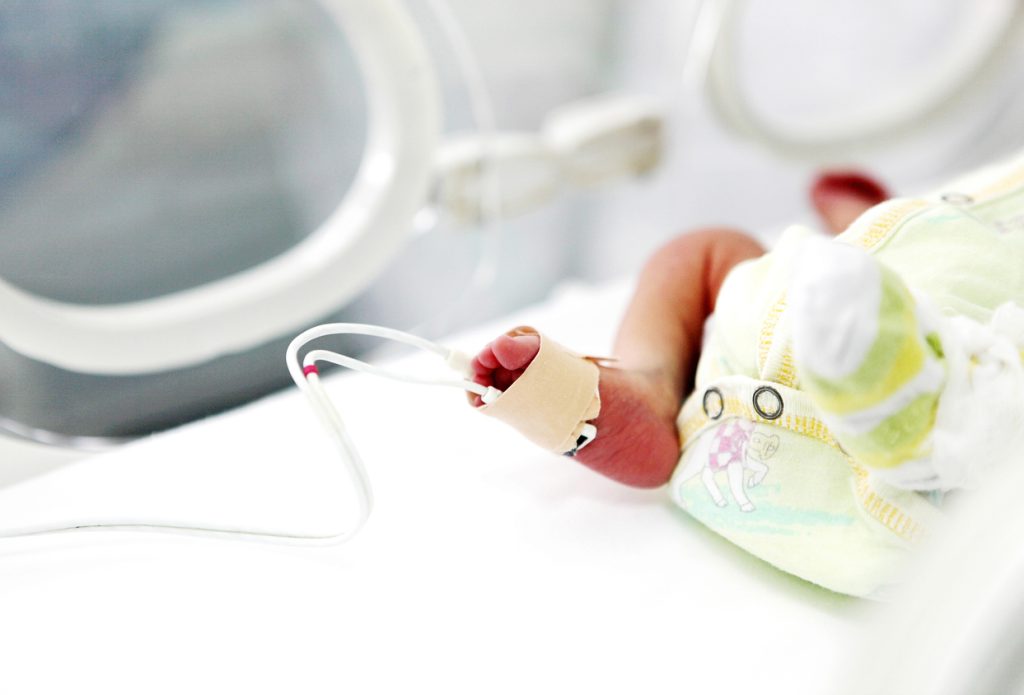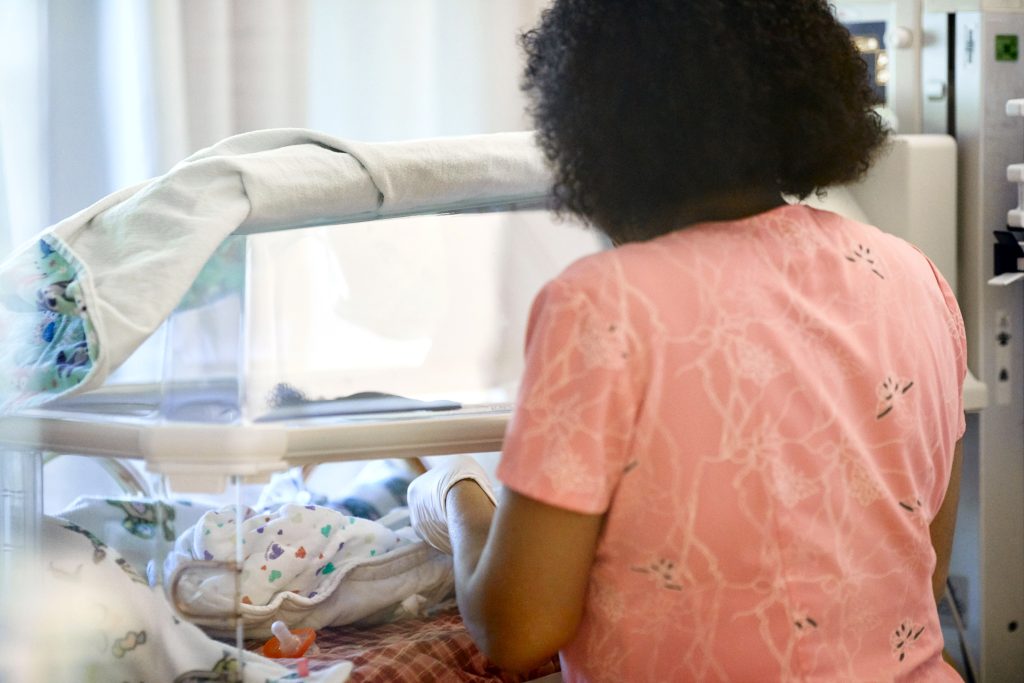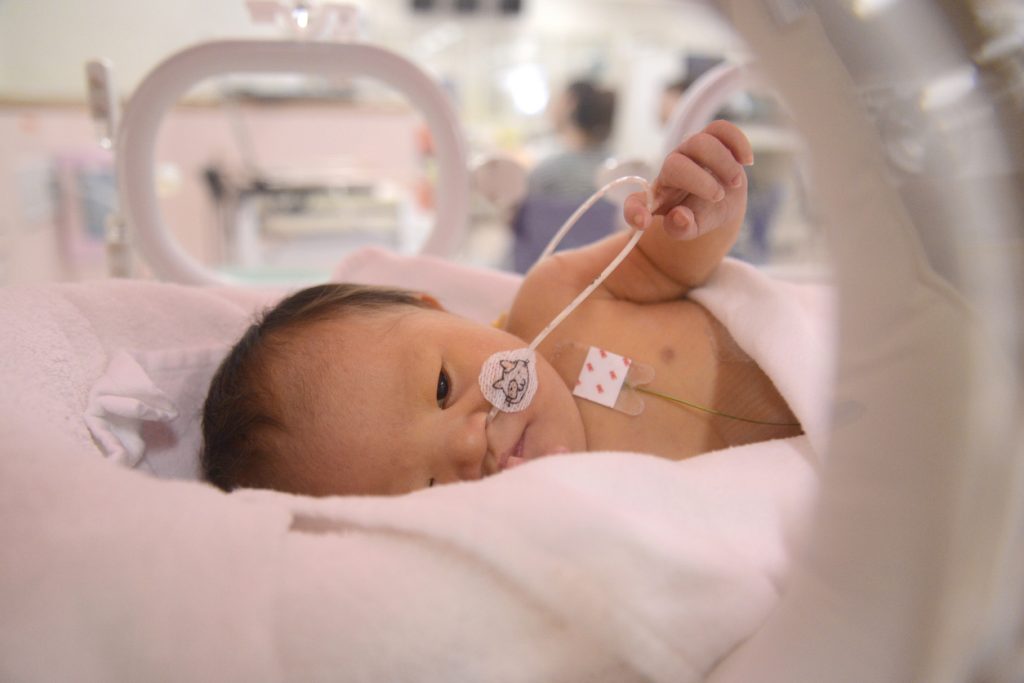This blog was medically reviewed by Dr. Katie Braski, neonatologist at Children’s Minnesota.
As soon-to-be parents eagerly anticipate the arrival of their newborn baby, the unexpected journey of having a baby in the neonatal intensive care unit (NICU) can be overwhelming.
The Mother Baby Center is a partnership between Allina Health and Children’s Minnesota. So, if you give birth at one of our locations, but your baby needs higher levels of care, we hope you take comfort in knowing you have access to the best neonatal intensive care that Children’s Minnesota offers.
In this blog, you’ll learn what to expect when caring for your NICU baby, from common reasons for care to helpful tips.

Nurture the bond with your baby through kangaroo care and learn how the skin-to-skin connection supports well-being and growth.
What is the NICU?
NICU stands for neonatal intensive care unit and is a specialized hospital unit that provides around-the-clock neonatal care for premature or ill newborns. In the NICU, infants receive specialized medical attention, monitoring, and support tailored to their individual needs in an environment equipped to handle critical situations.
The neonatology program at Children’s Minnesota provides clinical expertise and compassionate care for thousands of newborns each year. Plus, The Mother Baby Center conveniently connects to the Children’s Minnesota neonatal intensive care and special care nurseries.
Seven reasons for NICU baby care
A wide range of reasons may require your baby to be admitted to the NICU. They may have been born prematurely, have breathing problems, or developed an infection. Keep reading to learn about some of the reasons a baby is in the NICU.
Prematurity
Prematurity occurs when a baby is born before 37 weeks of gestation. The severity varies, and preterm infants may need to stay in the NICU for weeks to months to receive essential care and support for their development.
Low birth weight
Infants born with low birth weight, typically less than 5.5 pounds, may face challenges in maintaining body temperature, feeding and growing. Doctors determine their stay in the neonatal unit based on their growth and developmental progress.
Respiratory distress syndrome (RDS)
Respiratory distress syndrome (RDS) is a breathing problem that affects newborns, mostly those who are born more than six weeks early. Babies born earlier or more premature are more likely to develop RDS.
Many babies with milder symptoms get better in 3-4 days. NICU babies who are very premature will take longer to recover.
Sepsis or infection
Newborn infants can develop infections, such as sepsis, which require immediate medical intervention. The severity of the infection determines the length of the stay for the newborn in the hospital.
Hypoglycemia
Hypoglycemia is when newborns have low blood sugar levels. It can lead to complications if not managed promptly. Babies with hypoglycemia may require monitoring and treatment in the NICU until their blood sugar stabilizes.
Perinatal depression
For a birthing person experiencing perinatal depression, the NICU journey may be emotionally challenging. Support and understanding are crucial for the well-being of both the mother and the baby during their NICU stay.
Learn more about what to expect during the postpartum recovery period.
Maternal chorioamnionitis
Maternal chorioamnionitis is an infection of the fetal membranes during pregnancy. Infants born to mothers with this condition may need specialized care in the NICU depending on the severity of the infection.

Understand what to expect during the postpartum recovery period for you and your baby.
Less common reasons for NICU care
While less common, certain conditions may still require NICU hospital care, including birth defects, seizures and more.
- Birth defects: Some babies born with birth defects may require a little extra care in the NICU before going home.
- Medicine or resuscitation in delivery: If your baby needs resuscitation at birth, your newborn may need to stay for additional monitoring and or treatment before going home.
- Seizures: If your baby experiences a seizure after birth, the neonatal team will want to keep your baby under their care until they can get answers about the seizure(s).
- Special treatment or procedures: A newborn may need special treatment or procedures depending on how labor/delivery occurred, their clinical status after birth, or unexpected newborn screening results.
How long will your NICU baby be there
The length of a baby’s stay in the NICU is individualized based on their condition, response to treatment and overall health. While some infants may require a short stay for observation, others may need more extended care for weeks or even months.

Ensure your child’s health with a caring, and experienced physician, and find a provider today.
Who takes care of your baby
The NICU staff is a dedicated team of health care professionals specially trained to provide comprehensive care for newborns. Children’s Minnesota’s neonatal team of more than 500 doctors, surgeons and pediatric specialists is the largest in Minnesota — and one of the largest in the country.
From neonatologists, neonatal fellows and neonatal nurses to registered nurses, dietitians, lactation consultants and social workers, the NICU team plays a vital role in the well-being of NICU newborns.
- Neonatologist: A neonatologist is a medical doctor who will help provide care and support while your baby is in the NICU. Children’s Minnesota offers 24/7 access to a neonatologist.
- Neonatal fellow: A neonatal fellow is someone who has finished medical school and pediatric residency and is now doing additional training to be a neonatologist.
- Nurse practitioner: Neonatal intensive care nurse practitioners are nurses who have advanced education and training. They will be there to help your baby in the hospital every step of the way.
- Registered nurse: NICU nurses are part of the NICU care team and will help provide direct care to your baby throughout their NICU journey.
- Lactation consultant: Our lactation consultants offer support to families and babies learning how to breastfeed. They can help you at The Mother Baby Center or Children’s Minnesota if your stay is extended.
- Social workers: Our clinical social workers provide services to help patients and families cope with physical, emotional, and social issues and concerns.
How you can care for your baby in the NICU
Despite the challenges faced by families with babies in the NICU, there are ways to actively participate in their care and bond with them. Simple acts like gentle touches, kangaroo care and talking or reading to them can go a long way.
- Gentle touch: Your newborn may need an incubator which can make you feel distant from them, but there are typically small portholes in the baby incubators for you to reach a hand in and gently touch your baby.
- Kangaroo care (skin-to-skin): Kangaroo care is a method of skin-to-skin contact that can provide your newborn with many benefits. Research has shown that skin-to-skin contact after birth can help premature babies regulate their body heat and heat rate. Talk with your NICU care team before doing kangaroo care.
- Talk, read or sing: Talking, reading or singing are all ways to help your baby get to know your voice but also to let them know you are there with them, helping soothe them.
- Let your baby rest: The most important thing is for your baby to grow, develop and recover as they are in the NICU, one great way to do this is through rest.
Caring for multiple NICU babies
For families with multiples in the NICU, dividing attention and care among the newborns can be demanding. Spending quality time with each baby, maintaining proper hygiene, seeking help when needed and following NICU guidelines are essential for their well-being.
- Spend time with each baby: Divide your time between your babies in the NICU. If you have a partner, you can always divide and conquer as a team giving each baby time with each parent.
- Wash hands or sanitize between babies: Safety and health are most important in the NICU. Make sure to wash or sanitize your hands between visiting each baby. Follow the rules related to hand washing in the NICU.
- Ask for help: If you are feeling overwhelmed, we encourage you to ask your health care team (or your family) for help.
- Follow NICU rules and protocols: We want to keep your baby safe, so we ask you to always follow the NICU rules and protocols.

Meet and connect with other families in support groups available through The Mother Baby Center.
Who can visit your baby
Visitation policies in the NICU may vary. The Mother Baby Center has updated its visiting guidelines to protect all patients, family members, visitors, and staff. These visiting standards are for both The Mother Baby Center and neonatal units.
Adhering to hospital regulations and infection control measures ensures a safe environment for the baby’s recovery.
What if you can go home but your baby can’t?
In some cases, you may be healthy enough to go home, but your baby may not be. Leaving the hospital without your baby can evoke a myriad of emotions, including guilt, sadness and anxiety.
Coping tips such as seeking support from loved ones, self-care practices and staying connected with the health care team can help parents navigate this challenging period.
- Support of loved ones: Always remember that your loved ones are here to help. Don’t hesitate to reach out and ask for it.
- Self-care practices: Doing something for yourself can be as simple as taking a relaxing bath, going for a walk or reading a book. Any self-care can help you be the best version of yourself to feel prepared when your baby finally comes home.
- Stay connected to the care team: You can stay connected to your baby’s care team if you go home and they stay in the hospital with updates and check-ins.

Double-check your third-trimester checklist so your family is ready when it’s time to bring your little one home.
NICU babies home after TMBC stay
The Mother Baby Center proudly offers a unique, personalized experience for each baby and their families with the highest level of safety and care throughout the childbirth journey. That means we care for the whole family – your baby, you and your family. We do this through our different partnering organizations like Allina Health, Children’s Minnesota, the Midwest Fetal Care Center, Ronald McDonald House and more.
But, as your NICU baby grows and if they face any additional challenges, the Children’s Minnesota’s Intensive Care Follow-up Clinic is here to help.
To show you how we care for the whole family, we shared five inspiring birth stories from the NICU and the Midwest Fetal Care Center.
Owen’s life changed after 16 minutes
Owen has been through more than most of us have in our lifetimes. Immediately after birth, Owen lost his life for 16 minutes. After resuscitation, Owen breathed life again. Thanks to the expert care at The Mother Baby Center and Children’s Minnesota, Owen is now smiling and giggling at home.
Aria beats the odds and thrives
Before birth, Aria was diagnosed with a rare combination of health complications. Through the help of Children’s Minnesota and the Midwest Fetal Care Center, Aria was able to beat the odds.
Delilah and William shared diagnosis
Rebecca and Joe’s first child Delilah was born with coarctation of the aorta. This rare congenital heart defect (CHD) makes up only about 4-6% of all CHDs. When they were pregnant with their second child, they were stunned to learn this baby had the same CHD as Delilah.
Thanks to the expert care from the Midwest Fetal Care Center and the Children’s Heart Clinic, Delilah and William are both doing well.
The Mother Baby Center: expert care delivered for every NICU baby and family
Being NICU moms and NICU parents can be a lot for a family to go through. With the support and guidance provided by The Mother Baby Center, every baby and parent receives exceptional medical care and holistic care tailored to their needs.
Whether septuplets, preemies, babies with heart failure, or those that just need a little extra care, we’re here to care for all babies. And we’re proud to have some of the highest survival rates and lowest complication rates in the world. Learn more about our NICU care or find a provider that can assist you with your birthing journey at The Mother Baby Center.